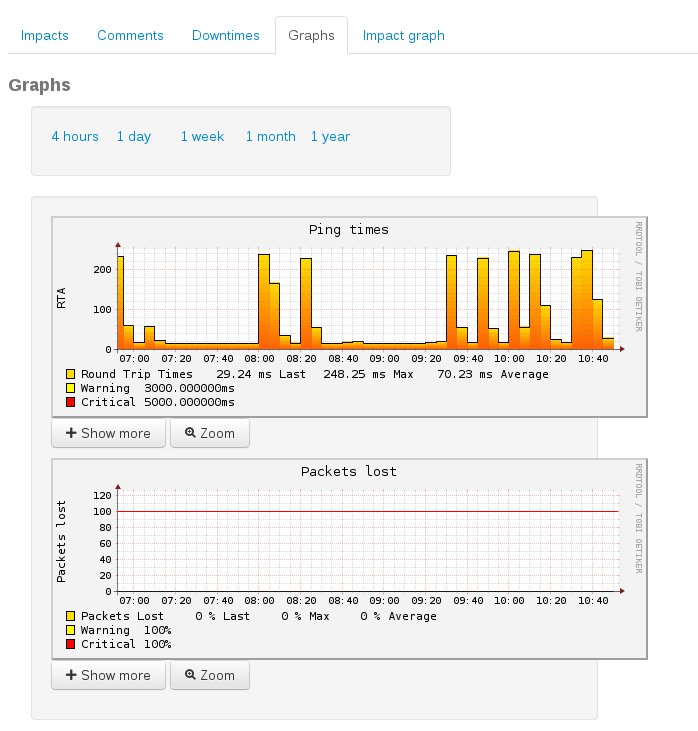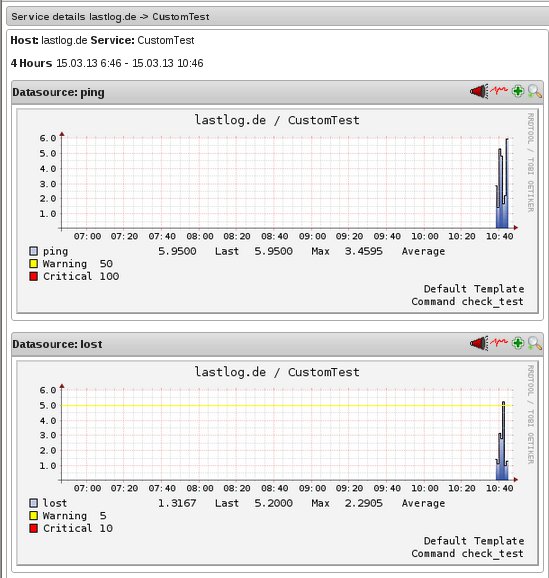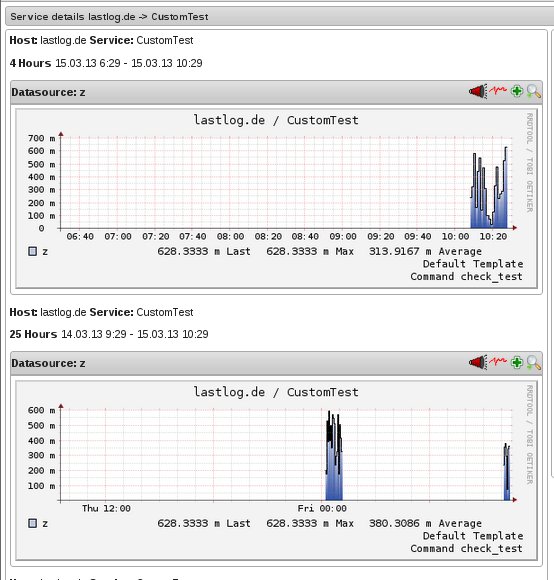shinken 1.2.4 on ubuntu desktop 12.10 iii
15 mar 2013
motivation
in this posting i want to enhance the shinken usage with a few new ideas
adding check_ping to hosts
there are two ways:
one adds it to the template.cfg in the generic-host record
# Generic host definition template - This is NOT a real host, just a template! # Most hosts should inherit from this one define host{ name generic-host # Checking part # no check_command by default. check each 5 min when all is OK/UP # and make 3 checks (one bad then 2 others) for going HARD and so # raise notifications max_check_attempts 2 check_interval 5 # Check every time active_checks_enabled 1 check_period 24x7 # Notification part # One notification each day (1440 = 60min* 24h) # every time, and for all 'errors' # notify the admins contactgroups by default contact_groups admins notification_interval 1440 notification_period 24x7 notification_options d,u,r,f notifications_enabled 1 # Advanced option. Look at the wiki for more informations event_handler_enabled 0 flap_detection_enabled 1 process_perf_data 1 # Maintenance period #maintenance_period workhours # Dispatching #poller_tag DMZ #realm All # For the WebUI #icon_set server ; can be database, disk, network_service, server # This said that it's a template register 0 check_command check_ping }note: some hosts might respond to ping because it is disabled, thus your results are STATE_CRITICAL so it might be a better idea to add it per host.
one adds it per service or host entry, see [1] for service example:
define host{ host_name serverkommune.de hostgroups joachim contact_groups admins address serverkommune.de check_command check_ping use http }
looks like:
how to write a custom test which generates a RRD graph -> perfdata
see [2] and [3]
specification
the right structure is :
what_you_want_to | variable1=value;warning_threshold;critical_threshold;min;max, variable2=value;;warning_threshold;critical_threshold;min;max- min and max can be empty
here is the modified example from the last blog posting about shinken:
#! /bin/bash
#
# js@lastlog.de
# 05/03/2013
#
# This Nagios test plugin was created to demonstrate how it is integrated into shinken
# now with perfdata creation
#
PROGNAME=`basename $0`
PROGPATH=`echo $0 | sed -e 's,[\\/][^\\/][^\\/]*$,,'`
REVISION="0.0.1"
. $PROGPATH/utils.sh
print_usage() {
echo "Usage:"
echo " $PROGNAME --help"
echo " $PROGNAME --test"
echo " $PROGNAME --version"
}
print_help() {
print_revision $PROGNAME $REVISION
echo ""
print_usage
echo ""
echo "Nagios test plugin"
echo ""
echo "--test"
echo " Perform a test; in this implementation it either returns: STATE_OK STATE_CRITICAL STATE_UNKNOWN "
echo "--help"
echo " Print this help screen"
echo "--version"
echo " Print version and license information"
echo ""
support
}
# Information options
case "$1" in
--help)
print_help
exit $STATE_OK
;;
-h)
print_help
exit $STATE_OK
;;
--version)
print_revision $PROGNAME $REVISION
exit $STATE_OK
;;
-V)
print_revision $PROGNAME $REVISION
exit $STATE_OK
;;
--test)
# STATE_OK
# STATE_WARNING
# STATE_CRITICAL
# STATE_UNKNOWN
# STATE_DEPENDENT
# $(($RANDOM%3))
f=$(($RANDOM%9))
l=$(($RANDOM%9))
case $(($RANDOM%5)) in
0)
# ping=2;50;100;; lost=0;5;10;;"
echo "STATE_OK - $(date) | ping=$f;50;100;; lost=$l;5;10;;"
exit $STATE_OK
;;
1)
echo "STATE_WARNING - $(date) | ping=$f;50;100;; lost=$l;5;10;;"
exit $STATE_WARNING
;;
2)
echo "STATE_CRITICAL - $(date) | ping=$f;50;100;; lost=$l;5;10;;"
exit $STATE_CRITICAL
;;
3)
echo "STATE_DEPENDENT - $(date) | ping=$f;50;100;; lost=$l;5;10;;"
exit $STATE_DEPENDENT
;;
*)
echo "STATE_UNKNOWN - $(date) | ping=$f;50;100;; lost=$l;5;10;;"
exit $STATE_UNKNOWN
;;
esac
;;
*)
print_usage
exit $STATE_UNKNOWN
esacexample 1
echo "STATE_OK - PING = 2ms & LOST = 0 packets | ping=2;50;100;; lost=0;5;10;;"the output looks like this:
example 2
echo "STATE_OK - $(date) | z=0.$f"the output looks like this:
thanks
thanks to Issif and hufman from shinken#irc.freenode.org for explaining me the concept behind custom perfdata generation as shown in the examples!
links
- [1] http://docs.icinga.org/latest/de/macros.html
- [2] http://www.shinken-monitoring.org/wiki/official/advancedtopics-perfdata#plugin_performance_data
- [3] http://nagiosplug.sourceforge.net/developer-guidelines.html#AEN201
- [4] http://www.nagios-wiki.de/nagios/howtos/nagiosgrapher
- [5] http://www.shinken-monitoring.org/wiki/official/advancedtopics-perfdata#plugin_performance_data





